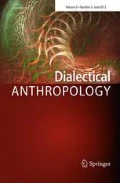Conclusion
The challenge of communicating Africa's contributions is complex, but very important: it involves the re-thinking and re-shaping of such basic notions as power, gender, divinity, ecology, and much more. Most importantly, Africa can teach us to recognize the basic unity of the human race, our universal human condition and problems, while at the same time creating an awareness of different, although interrelated, histories, alternative cultural strategies and adaptations. As Stanley Diamond has pointed out, alternatives are increasingly important with the realization of Western failures in coping with universal human issues such as adolescence, gender relations, death, and care for the elderly. Looking for alternatives may be imperative, as we are increasingly faced with homelessness, failing health care, dirt and urban decay, serious environmental problems, man-made “natural” disasters and diseases, abuses of power and much more. Decolonizing the African experience involves recognizing the subtle, highly successful and time-proven strategies and concepts developed in Africa, and acknowledging her contributions and inspirations, both for Africans and non-Africans alike.
Similar content being viewed by others
Author information
Authors and Affiliations
Rights and permissions
About this article
Cite this article
Jell-Bahlsen, S. “This native something”: Understanding and acknowledging the African experience. Dialect Anthropol 19, 373–386 (1994). https://doi.org/10.1007/BF01301463
Issue Date:
DOI: https://doi.org/10.1007/BF01301463




